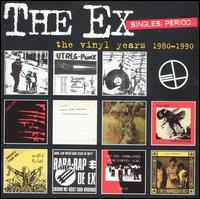Perhaps one of the most unfortunate things about the recent focus of the music industry on "American" punk and hardcore acts is that it forces much of the genre and fans to adopt a distinctly American perspective. A browse through your local record store's punk and hardcore section will reveal a multitude of American, white, middle-class-male opinions and a distinct lack of viewpoints from women, Europe or the developing world. Certainly, it isn't fair to expect the aforementioned white, middle-class musicians to write about poverty with any sort of authority particularly when the bulk of their exposure to that world is through secondary sources.
Even the bands who break from this mold are somewhat confined by their limited perspective; until you visit Ethiopia, your only understanding of the abject misery of people in poverty is based on maudlin Sally Struthers commercials and UNICEF boxes at Halloween.
This single fact is part of what makes the music of Dutch punk stalwarts the Ex so important; not only does the band seamlessly synthesize the music of indigenous cultures into their music; the band also regularly visits Africa and other developing nations to speak directly to the people they aim to speak for.
The band formed in the late `70s, energized by the burgeoning punk rock movement as well as looking for a way to express their own frustrations with the staggering social injustice of `70s Amsterdam. According to the band, the police in particular were brutal to disaffected youth, many of which were seething in a sea of unemployment and unaffordable high rent. The band incorporated the same collective mentality as Crass, seeing their anarcho-socialist views and their music as indelibly connected.
Though the band has regularly released material, most recently through Touch and Go, much of the band's material was originally issued on limited cassette or vinyl and was seemingly lost to the general public. This long-awaited singles package finally unearths some of those precious singles to hopefully immortalize them as the crucial works that they are.
Organized chronologically, the album begins in much of the same spirit as their American and British peers: Simple three-chord punk rock with that steady 1-2 drumbeat, but by the end of the album much of the future sound of the band is clear; elements of early industrial music like Einstürzende Neubauten begin to show up, as well as moments of jazz and folk, elements which defined later albums like the particularly wonderful Starters/Alternators and Turn, which took the same sort of progressive left turns as the band with which they are most often compared: Fugazi.
Though the sound had not taken shape in that early era, much of the band's political views were seared into the lyrics even then; album opener "Human Car" lashes out against commodification, "Weapons for El Salvador" takes the Ronald Reagan administration to task for the brutal results of his attempts to use the nation as a wedge between the Sandinistas and the Cubans.
Politically and musically incendiary, the Ex is a challenging and difficult band, even today. Singles. Period. is not music designed for background listening; the steep progression over the album, unconventional sounds and brutally honest lyrics demand attention and deserve yours.
